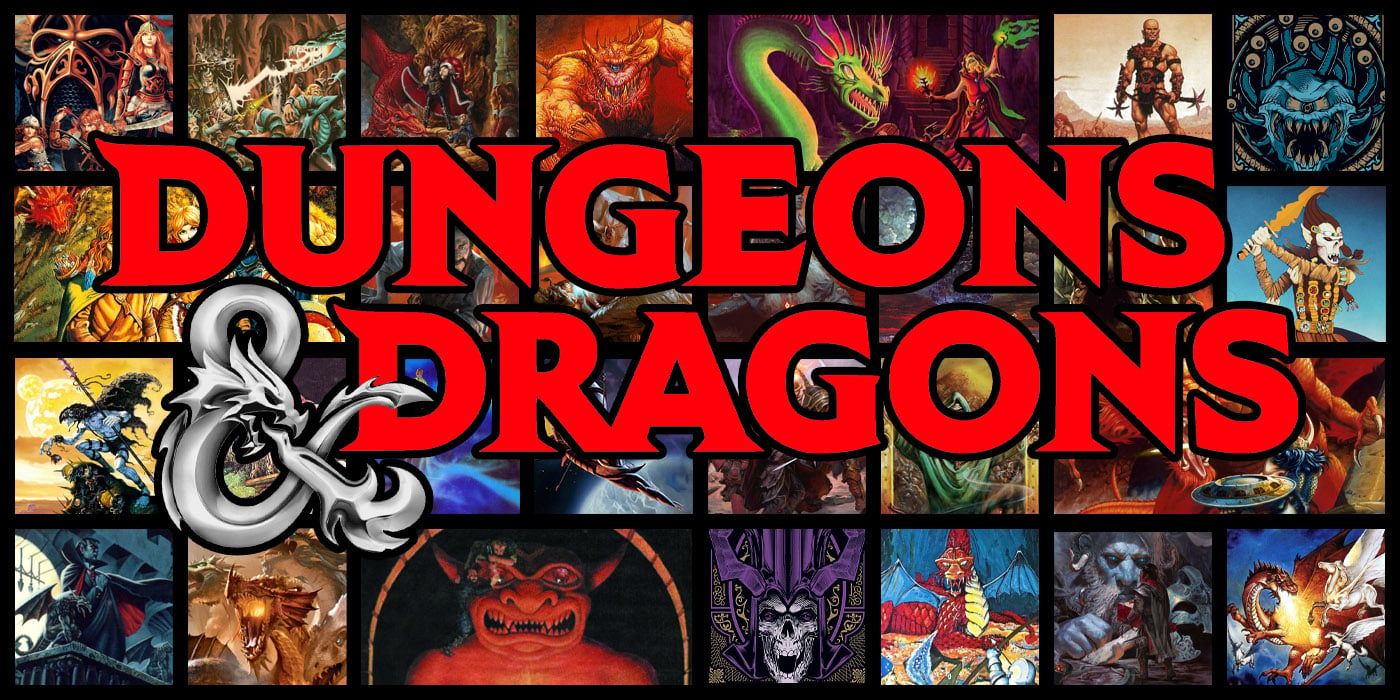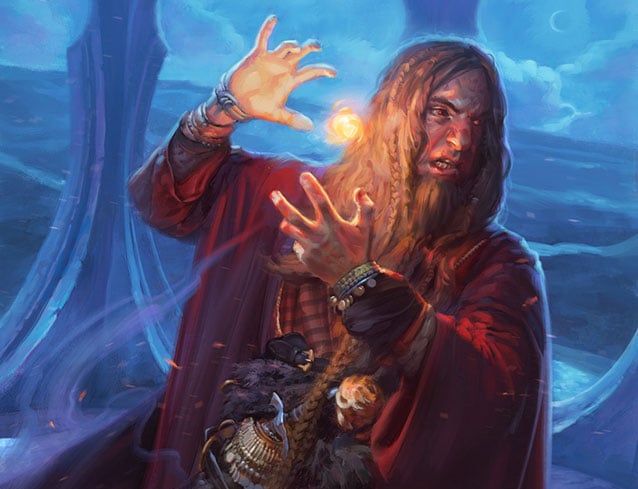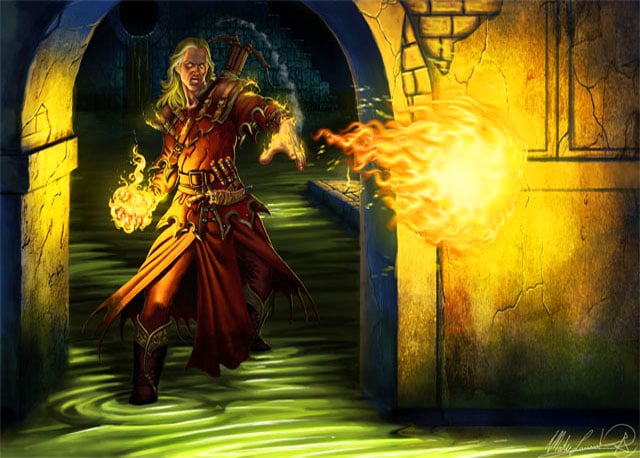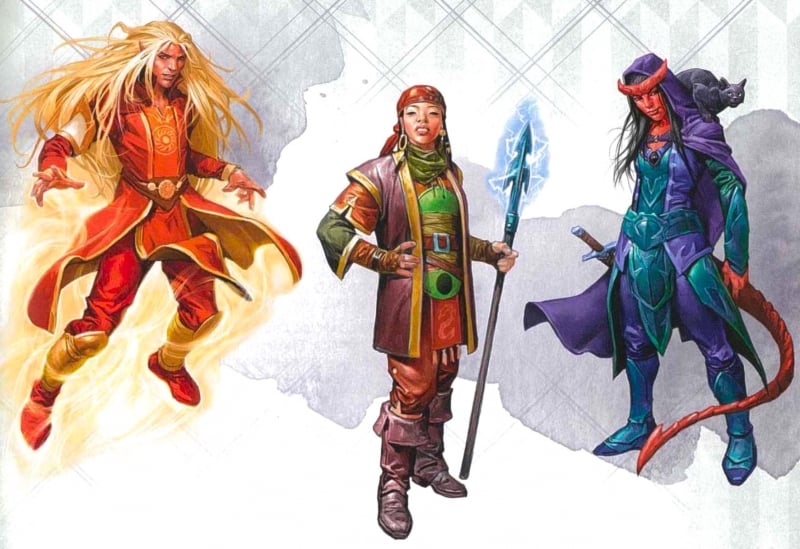D&D: Starting A Sorcerer – Spells, Spells, And More Spells

Sorcerers are an interesting paradox–they have a limited spell selection, especially compared to Wizards. But within that narrow band they have much more flexibility.
Sorcerers are this interesting concept, they’re about intense flexibility moment to moment, but at the cost of overall versatility. The Sorcerer has a handful of things they can do–but they can do them a lot–sustaining themselves rather well moment to moment. Introduced in 3rd Edition as a font of magic that blended Divine Caster flexibility with Arcane spell selection, the Sorcerer has always been about being able to get the most out of your spell slots (whether by having more of them, or in 5th Edition, by modifying them). They’re the “raw power” answer to the careful study of Wizards.
Power Overwhelming
As spellcasters, most of what their class can do comes down to spells. All of your basic class features are about giving you more, or different ways to use your spell slots. You’ve got Font of Magic, which lets you spend a limited pool of sorcery points to either give yourself more sorcery points, or you get a little more oomph out of one of your spells with Metamagic abilities.
At the end of the day this is what makes the Sorcerer stand out–they have the same amount of spell slots that any other caster does, but they rely on efficiency. Especially since they’ll only ever know 15 spells or so. Spells are the primary way that Sorcerers interact with the world, so when you add something to your spell list, you’re saying, “I want to do this with my character.”
That said, on the Sorcerer spell list you’ll find a pretty decent selection. There are spells in there for dealing damage, for battlefield control, for dealing with a powerful single target, for supporting the party, and so on. The various subclasses will slant you a little more in one direction or another. But most of what they do is centered around spellcasting–and because so much of what you do revolves around that, let’s take a closer look at metamagic and what it can do for you–then we’ll get to the Origins.
Careful Spell: This combos very well with a spell that hits a whole area and does nothing on a successful save. Is that fighter up there while you want to let loose with a Hypnotic Pattern or Confusion or something–you can effectively spare them. So if you really want to lay down some control, this is a great choice.
Distant Spell: This can be surprisingly helpful with mobility–because you’ll be able to cast your spells from a safer distance. Drop Haste from even further away, or hit them with a closer-in control spell without needing to worry about getting hit.
Empowered Spell: If you want to do damage, this one is a great back-pocket option to make sure that your spell slot spells really hurt when you need to. Being able to reroll 5 (most likely) dice that turned up pretty lousy can make a huge difference.
Extended Spell: This one is sneaky–so a lot of people use it to make their “breakfast spells” last a little longer. But–it can also work on spells that have an offensive use as well. If you’re a control caster, you can really dictate the flow of the fight. Take a powerful target out for a long time with an Extended Banishment or a Suggestion that just keeps on giving.
Heightened Spell: This one is incredibly powerful. Giving someone disadvantage on that first save is a great way to shut down an encounter in the first round. It’s expensive, but dang does it help you take on powerful opponents. Works great for either damage or control spells (looking at you Disintegrate, Blight, or Banishment [again]).
Quickened Spell: For 2 sorcery points, you can cast a spell as a bonus action. Keep in mind you can only cast a maximum of one spell that takes spell slots during your turn (but you could conceivably get 2 cantrips out if you need to finish off your opponent), but a lot of sorcerers appreciate this kind of economy to their actions–cast a spell that takes your action to do something, like a Witch Bolt or Storm Sphere and Quicken whatever other spell you want to cast. It opens up a wing of spells that don’t otherwise see much use.
Subtle Spell: Pick this metamagic option to make your DM hang their head every time you use it. Hide the fact that you’re casting spells in the middle of the grand banquet. Notably: Charm Person doesn’t have Material Components. No one will know until it’s too late.
Twinned Spell: Probably the best metamagic ability. Target two creatures with one single-target spell (see restrictions like it can only ever target one other creature) and for a paltry cost, you effectively get a free spell slot out of the deal (AND you can keep more than one concentration spell going at a time). Offensive or Defensive, this is great.
Origin Stories
Divine Soul sorcerers get to build one of the most unique spell lists that a sorcerer can. The biggest thing this class does is add cleric spells to your list. This gives you access to a broad range of arcane and divine options–honestly it’s a ton of fun. The rest of the class features give you some useful benefits if you’re healing, and a permanent fly speed is pretty great. A great pick for whatever role you want to fill.
Pick this class if you want to really play with flexibility and craft a custom spell list the likes of which the world has never seen.
Sorcerers with a Draconic Bloodline are one of the iconic sorcerers. They’re excellent at elemental spells (and if we’re honest it’s probably going to be fire) giving yourself the ability to do increased damage or have extra damage. If you want to take on multiple enemies, or a single powerful one–this is the subclass for you. It’s the iconic hurling powerful magic around subclass.
Pick this class if you want to deal damage first, and ask questions later.
Shadow Magic empowers sorcerers to call upon the powers of that lurk between life and death–draw upon the fell and shadowy power of the…uh…shadow fell. It offers up a couple of extra options for your sorcery points that are incredibly powerful. If you thought Heightened Spell was good, imagine a version of that that you can use on a single target that lasts until they die. That’s what Shadow Hound does–that combined with your ability to toss darkness around willy-nilly (and still being able to see) makes these characters great at control.
Pick this class if you want to summon up spirits of air and darkness. Well. Mostly darkness.
Storm Sorcery is all about power…unlimited power.
Seriously. It is the thunder and lightning subclass. This one is interesting though, with Heart of the Storm and Storm’s Fury you want to be in the midst of your enemies. You don’t want to take too much in the way of damage, but you do want to be in their mixing it up. mobility is key for this subclass, but you’ve got Heart of the Storm which lets you fly 10 feet without AoOs, so you’ve got that covered.
Wild Magic rounds out the Sorcerer Selections with randomness. This relies on something interesting happen every time you cast a spell. It might be good. It might be bad. It might not be what you intended, but it definitely–definitely–will be interesting.
Pick this class if you want excitement every time your turn comes around in combat–and if you have a DM willing to make you wild surge.
Well that’s the sorcerer. An avatar of arcane magic. A bastion of power–within select confines. They can be a ton of fun to play, but you have to be ready to build your spell list from the get go.
Happy adventuring!







